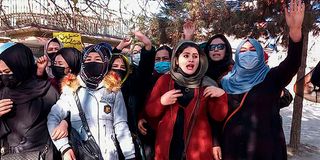2022: The nightmare that was for Afghan women

Afghan women chant slogans to protest against the ban on university education for women, in Kabul on December 22, 2022.
What you need to know:
- Taliban seized control over Kabul, Afghanistan’s capital on August 15, 2021.
- A month later, they imposed an education restriction that women would only attend universities with gender-segregated entrances and classrooms.
- Last March, the militant rulers stopped learning of girls in middle school and high school.
- Last November, they imposed a more radical rule that no more parks and gyms for women.
On December 10, during the International Day of Human Rights, Women Leaders of Tomorrow (WLOT) launched a campaign demanding for lifting of a school ban on Afghan girls by the Taliban.
A week later, the Taliban-led administration has done the worst, denigrating the whole purpose of the ‘Education is my right’ call.
The hard line Islamist group seized control over Kabul, Afghanistan’s capital on August 15, 2021 after a step-by-step win over the country’s provinces.
The group promised to grant women and girls access to education, work, and entrepreneurship, but its subsequent directives have continued to diminish their freedoms.
A month after their take over, they imposed an education restriction that women would only attend universities with gender-segregated entrances and classrooms. They were also to be trained by only women professors or old men. They also made it mandatory that all women students wear hijabs.
This was followed by another edict; Afghan women should not travel more than 72km without the company of a close male family member.
Last March, the militant rulers stopped learning of girls in middle school and high school.
Prohibitive orders
At the same time, they introduced gender segregated entry to the parks; women were permitted to visit parks on Sunday, Monday and Tuesday, while the remaining days were reserved for men.
The strings of prohibitive orders kept coming. On May 7, Taliban supreme leader Hibatullah Akhunzada issued a decree, tossing another brutish order.
He directed women to wear head-to-toe burqa in public. Should they fail to adhere, the woman’s father or closest male relative would be imprisoned or fired from government jobs to pay for her ‘crime.’
This was not all. Last November, they imposed a more radical rule that no more parks and gyms for women. The groups said they had to cut women out of the facilities because they flouted the gender segregation order.
“We have seen both men and women together in parks and, unfortunately, the hijab was not observed. So, we had to come up with another decision and for now we ordered all parks and gyms to be closed for women,” Aljazeera quoted Mohammed Akef Mohajer, a Taliban-appointed spokesman for Ministry of Vice and Virtue.
Then on December 20, they hit again. They banned women from university education.
Higher education
“You all are informed to implement the mentioned order of suspending education of females until further notice,” the Guardian quoted a letter issuing the directive signed by the minister for higher education, Neda Mohammad Nadeem.
The international outlet said the ministry’s spokesperson, Ziaullah Hashimi, who tweeted the letter, confirmed the order in a text message to Agence France-Presse.
The latest gender-oppressive directive has drawn a huge global uproar which has morphed into a Twitter protest under the hashtag #AfghanWomen.
US special envoy for Afghan women and girls, Rina Amiri, said the ban removes any doubt that the Taliban was reverting to the extreme policies they imposed during their previous rule in the 1990s.
“We are at an inflection point. As a global community, we must take a firm stand against these extreme policies. Failing to do so could embolden the Taliban, inspire hardliners elsewhere & imperil the rights of women, girls & at-risk populations far beyond Afghanistan,” she wrote on Twitter on December 21.
Sweden through its Ministry for Foreign Affairs also “strongly” condemned the edict and encouraged the Afghan women and girls that they stand with them “in their fight for human rights, including their right to education and to freedom of expression and movement.”





